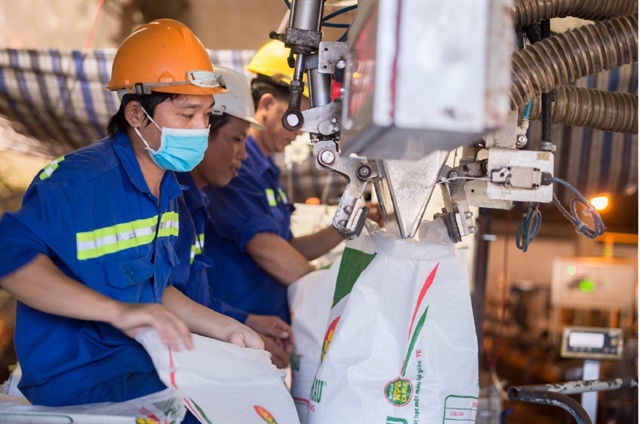
HÀ NỘI — The disruption of fertiliser supply caused by the COVID-19 pandemic has led to mounting counterfeit fertilisers in the past two years, exposing the need to tighten up the market.
Huỳnh Tấn Đạt, deputy director of the Plant Protection Department, said that counterfeit fertilisers had not been swept out of the market despite the fact that the authorities have established a fully-fledged legal framework.
He said counterfeiters moved their facilities to remote areas and did illegal work at night. As market management forces are understaffed in those areas, close inspections cannot be carried out frequently to keep such activities in check.
“Some counterfeiters go so far as to enter into an ‘implicit pact’ with bad wholesalers to form secret rings selling low-quality fertilisers. Many buyers have been taken in by these collaborations,” he added.
The deputy director urged the authorities to reinforce local market management forces to improve inspection works. He also called for a digital portal to keep buyers well-informed about both genuine and low-quality fertilisers.
Nguyễn Đình Xuân, deputy of the Tây Ninh Province’s Department of Agriculture and Rural Development, revealed that the department launched two inspection campaigns in Q1/2022 to inspect 37 production facilities. Remarkably, five fertiliser facilities and three pesticide facilities manufacturing fake products were detected.
“It is not an easy task to end counterfeit fertilisers since many genuine firms do not comply strictly with regulations on labelling. Regulation negligence has laid these firms open to counterfeiting,” he said.
The deputy urged firms to launch their own anti-counterfeiting campaigns and work closely with the authorities to nip counterfeiters in the bud. He also recommended farmers buy fertilisers from renowned wholesalers and not fall for cheap fertilisers.
“Farmers buying fertilisers in bulk can ask for sample tests. If the tests give suspicious results, do not hesitate to report the case to our department. Wholesalers must be held responsible for the quality of their own commodities,” he added.
Nguyễn Trí Ngọc, deputy director of the Vietnam Fertiliser Association, said that most farmers buy fertilisers from wholesalers because they cannot buy them directly from factories and facilities.
Accordingly, wholesalers are partly to blame for mounting low-quality fertilisers. Some wholesalers have collaborated with counterfeiters to manoeuvre the communities into the market.
“Fighting fake fertilisers should involve crackdowns on counterfeiters and a close watch on wholesalers. Some genuine firms have to use large discounts as an incentive to keep their wholesalers away from fake fertilisers,” he added.
The deputy director called on the authorities to step up inspections and impose more severe penalties to curb fertiliser counterfeiting. He also recommended the authorities remove obsolete fertilisers from the approval list to ease the work of management.
Lê Tiến Hùng, marketing manager of the PetroVietnam Cà Mau Fertiliser JSC (PVCMF), underscored that counterfeit fertilisers have been causing great damage to genuine firms’ profits and images.
Farmers also suffer the same financial fate as they spend a lot on soil nutrients only to see their crops fail yearly due to low-quality fertilisers.
“Genuine fertilisers are sold at around VNĐ20 million (US$862) per tonne. That means counterfeiters can easily pocket VNĐ4 billion with only 200 tonnes of fake fertilisers,” he said.
The manager revealed that his company have been organising information-sharing seminars to raise awareness about fake fertilisers. It has also incorporated QR Codes into its products to help farmers spot genuine products more easily.
“Initially, seminars and QR Code have produced good results. Farmers are happy because they no longer fall prey to counterfeiters,” he said.
Bùi Thị Thanh Giang, deputy head of the Planning Department under the Vietnam National Chemical Group, estimated that Việt Nam suffers an economic loss of US$2-2.5 billion each year due to counterfeit fertilisers.
To deal with the situation, she suggested amendments to Decree 84 on fertiliser management to raise the bar on fertilisers.
Specifically, fertilisers should have one or more key quality indices reaching 95 per cent instead of 70 per cent as stated in the decree, ensuring less fake product gets to the market.
She also suggested fertilisers be subject to value-add tax, thereby levelling the playing field for both domestic and imported fertilisers.
Finally, she urged genuine firms to rely on intellectual property rights to safeguard their products and cooperate closely with the authorities in the fight against counterfeiting. — VNS
- Reduce Hair Loss with PURA D’OR Gold Label Shampoo
- Castor Oil Has Made a “Huge” Difference With Hair and Brow Growth
- Excessive hair loss in men: Signs of illness that cannot be subjective
- Dịch Vụ SEO Website ở Los Angeles, CA: đưa trang web doanh nghiệp bạn lên top Google
- Nails Salon Sierra Madre
 VnExpress News The News Gateway of Vietnam
VnExpress News The News Gateway of Vietnam




